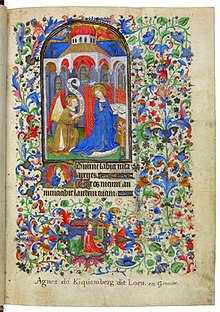
Nocturns (Latin: nocturni or nocturna) is a Christian canonical hour said in the nighttime.
In the liturgy of the Roman Rite of the Catholic Church, nocturns refer to the sections into which the canonical hour of matins was divided from the fourth or fifth century until after the Second Vatican Council.[1][2]
A nocturn consisted of psalms accompanied by antiphons and followed by readings, which were taken either from Scripture or from the Church Fathers or similar writings. Matins was composed of one to three nocturns.
Originating in a prayer service celebrated by early Christians at night, the liturgical office of matins was originally in Latin called vigilia (vigil, watch). The plural form, vigiliae (vigils, watches), also came into use.
The Latin adjective nocturnus corresponds to English "nocturnal" and is attached to many different nouns, such as nocturnae horae (the hours of the night), nocturna tempora (nocturnal times), which are not necessarily connected with religion and are unrelated to the subject of this article. The phrase hora nocturna (night hour) may refer to the canonical hour of vigils or matins, but not to the individual nocturns into which vigils or matins may be divided.
In Oriental Orthodox Christianity and Oriental Protestant Christianity, the office is prayed at 12 am, being known as Lilio in the Syriac and Indian traditions; it is prayed facing the eastward direction of prayer by all members in these denominations, both clergy and laity, being one of the seven fixed prayer times.[3][4][5]
- ^ Merriam-Webster Dictionary
- ^ Collins English Dictionary
- ^ Kurian, Jake. ""Seven Times a Day I Praise You" – The Shehimo Prayers". Diocese of South-West America of the Malankara Orthodox Syrian Church. Retrieved 2 August 2020.
- ^ Shehimo: Book of Common Prayer. Diocese of South-West America of the Malankara Orthodox Syrian Church. 2016. p. 5.
The seven hours of prayer create a cycle that provides us with a foretaste of the eternal life we will spend in the presence of God worshipping Him. ... We pray standing upright while facing East as we collect our thoughts on God.
- ^ Richards, William Joseph (1908). The Indian Christians of St. Thomas: Otherwise Called the Syrian Christians of Malabar: a Sketch of Their History and an Account of Their Present Condition as Well as a Discussion of the Legend of St. Thomas. Bemrose. p. 98.
We are commanded to pray standing, with faces towards the East, for at the last Messiah is manifested in the East. 2. All Christians, on rising from sleep early in the morning, should wash the face and pray. 3. We are commanded to pray seven times, thus...